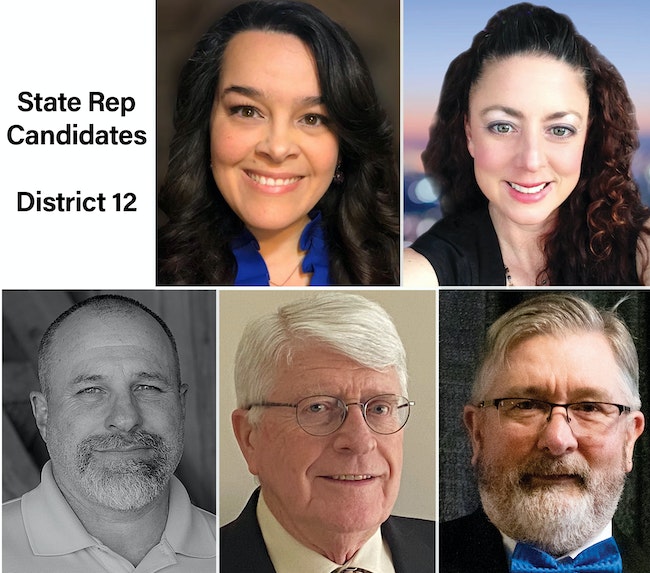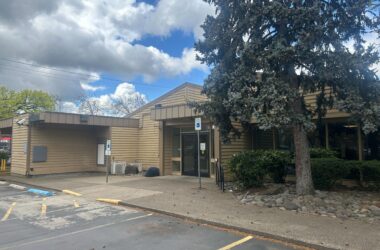 From top left: De Graff, Emmons, Conrad, Ledford & Gowing
From top left: De Graff, Emmons, Conrad, Ledford & Gowing
Editor’s Note: Last year, Oregon redrew its congressional map, leading Rep. Cedric Hayden (R) to pursue the new District 7 Senate seat. The House District 12 state representative seat, which encompasses Cottage Grove, Creswell, Oakridge, Coburg, Westfir and Junction City, is contested by Charlie Conrad, Nicole De Graff, Jeff Gowing, Bill Ledford and Michelle Emmons.
Chronicle: Detail primary issue facing education in rural schools. In which ways will you seek to update or modify laws to ensure a quality education experience is had in K-12 schools?
Conrad: Oregon’s education system lacks the ability to fully transition students from high school to living wage careers. Career Technical Education programs are a key piece of the puzzle to fill the labor shortage many sectors are currently experiencing, while still providing decent wage and career-oriented jobs for our children. Providing funding and reducing the barriers and disincentives will help improve this educational and career opportunity.
De Graff: Not all communities have the same priorities. With 5% enrollment losses let’s look at funding formulas: We are second in the US for highest enrollment drops and we need to know why. One way to improve education is to have the funding follow the student. Get rid of the 3% virtual charter cap! We spend about $13,000 on each student per year and if we care about equity we need to prioritize making sure our kids can read.
Emmons: The pandemic made apparent the lack of infrastructure to maintain quality educational experiences in our communities. My focus on education will include advocating for reliable broadband and classroom technology, including hybrid alternatives for students whose needs are better met at home. I will also support expanding Career Technical Education programs, pre-apprenticeship training, and dual enrollment opportunities to assist workforce readiness for high school graduates.
Gowing: There is a shortage of bus drivers, teachers and education assistants. They need support resources targeted to growing pipelines of educators, in addition to resources to support schooling, mentoring and after-school programs.
Ledford: Funding has always been a primary issue facing education in rural schools. I would work to pass laws that would prohibit the teaching of Critical Race Theory and other hot political topics. The Oregon State and USA flags should be the only flags allowed in classrooms. Oregon lowered graduation standards, but only 80.6% graduated in 2021.
Chronicle: How will you assist the area in better preparing for wildfire response and recovery for our rural towns in District especially in the wake of Holiday Farm Fire?
Conrad: Working with local businesses and community stakeholders is critical to identifying and prioritizing government assistance and action. Many organizations participate in emergency management training and exercises – these need to continue and include the communities. In short, we need to actively work to reduce the risk of disasters, training/planning for when they occur, funding resources to respond appropriately, and then ensuring communities are supported afterward by addressing barriers, especially land-use planning issues.
De Graff: The Holiday Farm Fire devastated hundreds. Many folks are still in temporary housing and some cannot rebuild, thanks to restrictive regulations. We need to listen to rational evidence based recommendations regarding harvesting and removing fuel to reduce severe fires. We need to fight fires in the beginning stages and ensure the necessary equipment is available. HB4097 was proposed to give volunteer firefighters an income tax credit. Unfortunately this wasn’t a priority. I am thankful that these brave men and women were on the frontlines so it’s the least we can do to recruit and retain.
Emmons: First, we must ensure the State delivers on resiliency tools and incentives for existing and new housing, and infrastructure, including emergency communications upgrades. Every at-risk community must have access to Firewise prevention strategies, and the means to implement them. Business Oregon can also serve to enhance business development as a vehicle for USDA and FEMA grants, to help improve local economies and job opportunities.
Gowing: Better removal of combustible materials in the forest. Establish rural Fire Districts, occupy lookout towers for hot spots. Salvage Logging for clean up on State and Federal lands.
Ledford: I would encourage Public Utility Districts to terminate power when a weather warning is issued for high winds during severe fire conditions. Since most all the fire and rescue departments are run with volunteers, when a fire such as the Holiday Farm Fire erupts, volunteers can not leave their jobs to go and fight. Some form of payment and job return must be guaranteed these volunteers. Only 8% of the homes destroyed in the Holiday Farm Fire have been replaced which indicates how difficult Lane County Land Management has been for property owners applying for building permits.
Chronicle: What actions will you take to lower the barriers to affordable housing and assist in solving the state’s housing crisis?
Conrad: The lack of affordable housing has been an ongoing issue for decades and will not be solved in the near future. A key aspect will be identifying and relaxing some land-use planning regulations for cities, enabling them to meet their future growth needs, while ensuring agricultural businesses remain viable and farmlands remain intact.
De Graff: We need to make decisions that reduce the cost of building. Don’t add barriers by eliminating mortgage interest rate deduction. I will explore the constitutional property tax freeze for seniors proposed by Rep. Cedric Hayden in 2019. I have seen firsthand how federal and state policies affect supply and demand. Adding more inventory would help. Explore zoning laws. Make the process easier on developers.
Emmons: First, I’d focus on recovery for the homes lost in the last climate disaster, then on preventive strategies to help people stay in their homes. While not all the elements of the recently passed Middle Housing legislation will work for our communities, I will work with local leadership to help identify where/how it makes sense to fill the gaps with appropriate development.
Gowing: Help connect property owners willing to sell with developers who specialize in low income housing. Look into grant programs and/or tax credit programs that create incentives to build low income housing.
Ledford: Assuming the state does have a housing crisis, relaxing government regulations will decrease the cost of multifamily housing development by 30%. Government also requires the workers to be paid the prevailing wage, which increases the cost of affordable housing.
Chronicle: What are the key issues rural communities face as it relates to healthcare and access to emergency services?
Conrad: Rural communities face two primary issues – proximity to adequate facilities and the ability to afford healthcare. Funding public safety includes supporting rural fire districts and aiding them in recruiting and training volunteers to respond to medical emergencies. Supporting local businesses and a vibrant local economy will enable businesses to pay wages at a level so that either people or the business can afford health insurance.
De Graff: More of us are spending more on healthcare and especially as we age. Having more telehealth providers helps but we must ensure rural areas retain providers. Portland legislators, knocked back pay parity bills for naturopathic doctors. Many are ending their primary care services as a result. The state should be creating more opportunities to access primary care doctors, not less. Another area is tax structuring. We saw the CAT tax close Bi-mart pharmacies across the state. The legislature did pass a slight fix to the scheme, so we will see if that helps.
Emmons: We need Rural designations to assist in healthcare provider retention, staffing capacity and EMS delivery. We also need reliable broadband infrastructure to upgrade our emergency communications network. Additionally, rural communities must be prioritized to support expanding public safety capacity within the current jurisdictional patchwork, including resources for first responders and medics trained in de-escalation, mental health and trauma-informed crisis intervention.
Gowing: Work with the larger providers of health care to establish satellite facilities in rural areas. Make sure all rural areas have some sort of EMS, even if it’s a volunteer department, getting care faster is essential.
Ledford: Recruiting physicians and supporting hospitals is very difficult for small communities. That makes it more difficult to have a long term physician- patient relationship. Since most emergency services are provided by the local fire department, sound funding for training and equipment is essential.
Chronicle: What concrete ideas do you have to support rural sectors of business owners in farming and agriculture, agritourism, forestry, wood products and green innovation?
Conrad: Agricultural businesses operate on a small profit margin, so a key is helping them keep expenses low i.e., not levying additional taxes or personnel costs and not creating supply and equipment barriers, while aiding and supporting an active market for their goods which they can easily access.
De Graff: Don’t pass laws like HB4002, that forced some farmers to flee the state. Rural needs differ from the ideologies of urban counterparts but we all benefit using our timber dollars to help fund public needs such as schools. Oregon’s loggers are the most conservation minded folks I have met. They know forests, they know the science and they know how to log sustainably.
Emmons: I support expanding high school CTEs, pre-apprenticeship and trades education; increasing transitional workforce opportunities in green energy; and providing incentives that encourage paid internships in locally established industries, such as forestry and agriculture. USDA grants and start-up incentives can be prioritized to address food security through year-round production and direct sales, and legislation must focus on increasing economic opportunities for small and mid-sized farms in Oregon.
Gowing: Our rural community is mainly small businesses and the economy is always changing forcing them to adapt to that economy. We need to be flexible to support them rather than being a hinderance.
Ledford: I would want to abolish all laws that hinder any economic enterprise from realizing its full potential that might be developed in District 12, like the CAT tax and the farmers overtime bill.
— Compiled by Erin Tierney







